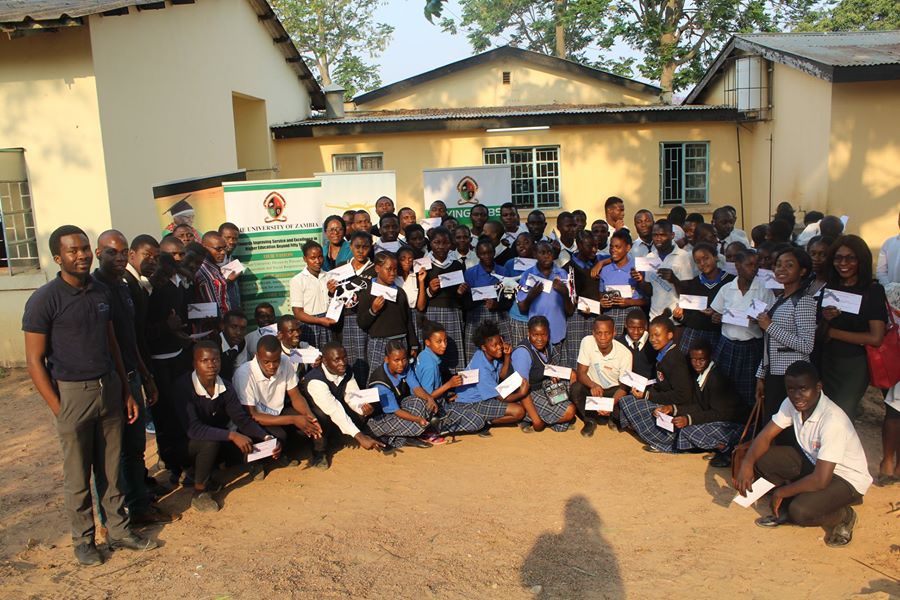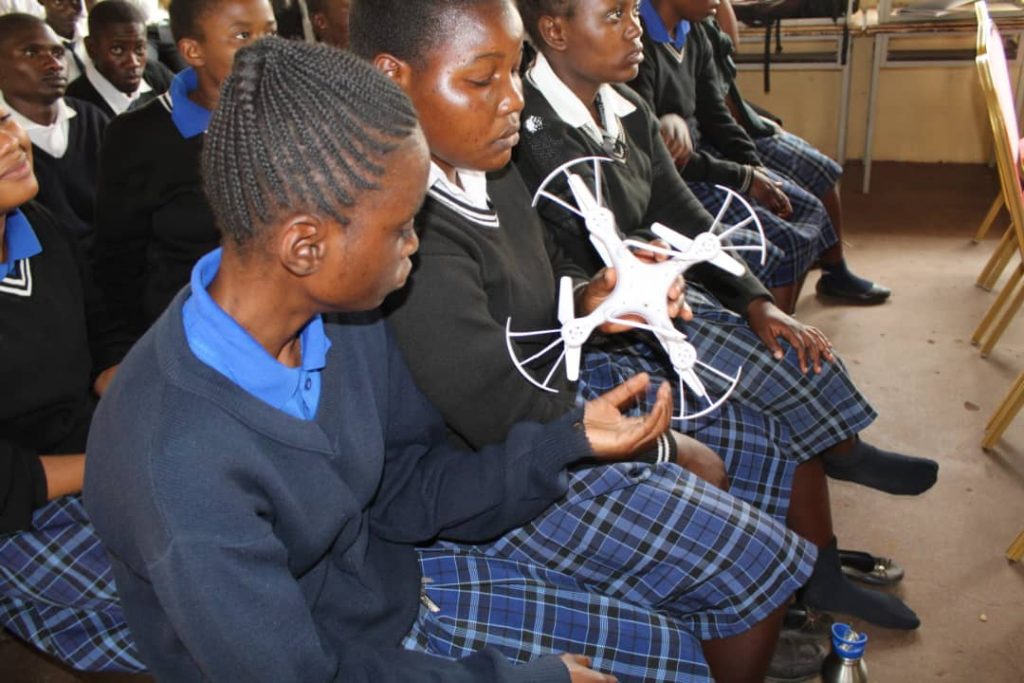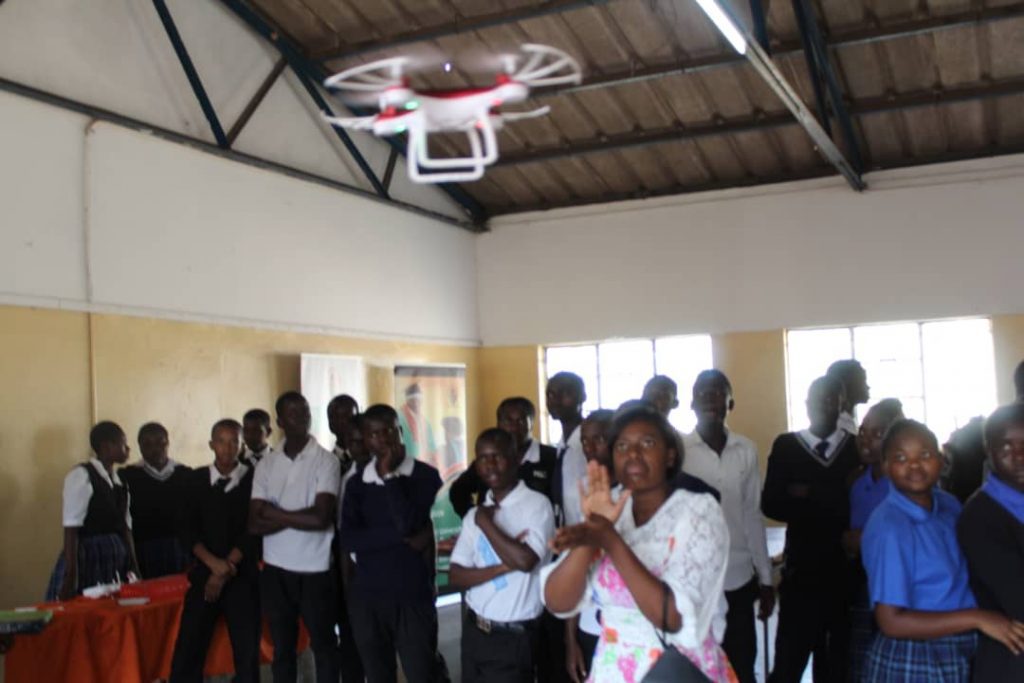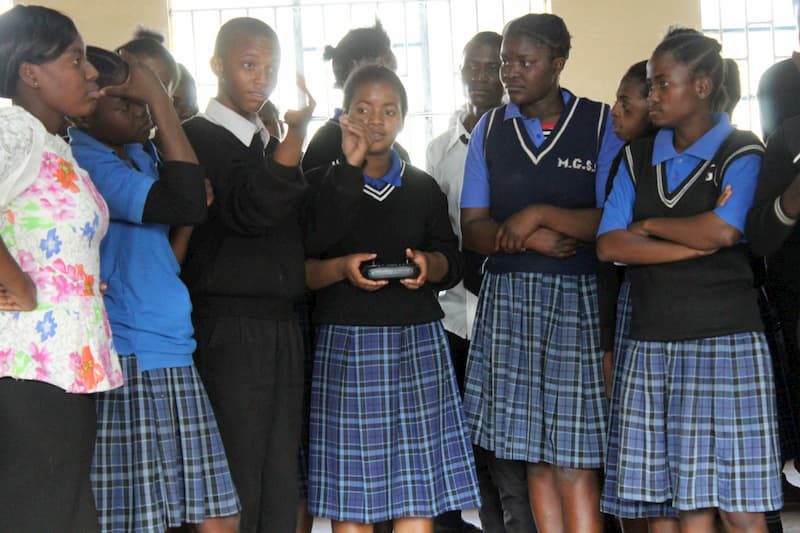
Zambia Flying Labs Brings Drone Training, STEM Education to Hearing-Impaired Students
Zambia Flying Labs aim is to enhance students' learning experience by using drones in the classroom, specifically in STEM Education.
April 9th, 2020
By Chitula Lukonde, Zambia Flying Labs
Zambia Flying Labs celebrated the first-ever Annual Flying Labs Day on September 25, 2019, with students from Munali secondary school under the theme "Drones for STEM Education for the Hearing-Impaired." The choice for Munali Special Education School for the Hearing-Impaired was aimed at promoting inclusive drones and robotics education for science, Technology, Education and Mathematics (STEM) as well as career opportunities in drones applications for the hearing-impaired.

Two days before, Zambia Flying Labs set out to demonstrate the remarkable capability of what drones can do. With crafted visually-appealing PowerPoint presentations and a line up of hands-on activities. We were ready to educate and share our knowledge as a means of inspiring the students to take up careers in drones. In the process, we learned valuable lessons. The event was a humbling and exhilarating experience, demonstrating that hearing impairment does not prevent someone from flying a drone.
The event started around 9 am with the arrival of guests and opening remarks from the Head Teacher, who thanked the Zambia Flying Labs for this initiative. After that, our part of the program kicked-off with the Head of the Department, who provided a brief history of Munali Special Needs School, which opened in 1905, and currently educates 68 deaf boys and 44 deaf girls. We introduced Zambia Flying Labs, what we do, and our affiliation with WeRobotics.
 Head of Department delivery History of the school in both spoken and sign language.
Head of Department delivery History of the school in both spoken and sign language.
Following the speeches, the program continued with the following five key activities:
(1) Career Talk 1: Engaging pupils in creative imagination and interactive activities.
This section involved telling pupils to write on a piece of paper what career they wanted. We received fascinating responses. Some wanted to be soldiers, policemen, teachers, and one even wrote, "the president." After creating an atmosphere where they could imagine what they wanted to become, they were more attentive to the things we presented.
Lesson Learned: These students are ambitious. As Zambia Flying Labs, we hope to capitalize on ambition by exposing them to different opportunities so that they have a broad sense of what career paths are possible for them to take.
(2) Science Made Fun 1: Interactive video and graphic presentation on Science and History of Flight.
This section involved giving a narrative on the history of flight. The videos, among others, showed the different use cases of drones in agriculture, transportation, and surveying.
Lesson Learned: Many people are unaware of the positive applications for drones. This is because of the infamous reputation of this technology. When asked, many people cite the military uses of drones. As Zambia Flying Labs, we hope to change the narrative by promoting the other applications for drones in helping people. Students should first-and-foremost understand this; that's why we had this exercise.
(3) Career Talk 2: Interactive presentation on STEM careers in engineering, science, technology, and innovation.
This section involved giving a career talk to the students on what career path they can take and reassured them that they still had a role to play in science-based fields such as robotics.

Lesson Learned: Lack of exposure is one of the most significant factors that attributed to the students not appreciating science-based fields or having the feeling of being left out. But as Zambia Flying Labs, this was an attempt to make sure that with opportunities being equal, anyone is allowed to choose whichever career path they desire.
(4) Science Made Fun 2: Interactive presentation on drones(Drones Technology and its application.
This section of the program was about explaining the different parts of a drone and also presented some of the safety features that should be strictly followed, as is customary for every drone training.
 Shamiso Kakote Zambia Flying Labs instructor-Instructing students how to operate a drone.
Shamiso Kakote Zambia Flying Labs instructor-Instructing students how to operate a drone.
Lesson Learned: Having an interactive presentation presents an opportunity for flexible learning where students are free to move around, touch the drone and investigate the different parts it has, we found this approach to be very useful.

(5) Science Made Fun 4: Interactive lessons and learning to fly the drones.
We divided the pupils into four groups, then among the groups, divided them into pairs: one to be the instructor and the other to pilot the drone. There was some challenge in translating scientific and technical concepts into sign language, as the assisting teachers struggled to find appropriate signs to communicate the ideas accurately. Despite the language barrier, the students adapted, and a majority of them quickly learned to take off and land the drone safely.
Lesson Learned: Among our team, none was an expert in sign language. The lesson we learned was that once the language barrier was broken, the students had no difficulty in taking up the challenge.

Awarding of Certificates
The event concluded with the presentation of Certificates of Participation for each of the students. We informally polled them about whether this experience would impact their future career choices, which we then received some positive feedback, assuring us that our efforts to introduce them to STEM were effective.
After the program ended one of the students was selected to give a vote of thanks, for bringing the training to their school
Zambia Flying Labs (ZFL) is a hub at the University of Zambia School of Engineering that is run by a team of local experts advancing drone technology in automation, transportation logistics and road safety, power distribution, and agricultural and community development. This is all part of the team's effort to provide solutions with meaningful social-economic impacts in their communities. Zambia Flying Labs became the 23rd Flying Labs globally to affiliate with WeRobotics.org.The goal of Zambia flying labs is to accelerate the positive effects of local and international aid, health development and environmental projects.by sustainable localizing appropriate robotics solutions, which means they train local partners on how to use robotics technology responsibly and effectively to accelerate and scale social good solutions
Additionally, Zambia Flying Labs aim to enhance student's learning experience by using drones in the classroom, specifically in STEM Education. "We aim at promoting such learning experiences and help students in the design and assembly of parts for the drone, programming for aviation and flight control, piloting of drones and practical applications of drones to solve problems," Dr. Balimu said, a lecturer at the University of Zambia and one of the critical member of Zambia flying labs
Zambia Flying Labs is still in its infancy. Yet, our success in organizing events like this one is attributed to supporting partners such as Allione Consultancy Engineers, University of Zambia, Zambia Civil Aviation Authority, Government Ministries, Media Houses, and our parent organization WeRobotics.We hope to partner with more institutions in promoting Inclusive STEM education.
Category(s)
Recent Articles
View All »

Fixed-Wing, Rotary-Wing, and VTOL Drone Training with Japan Flying Labs
